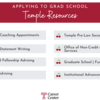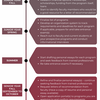Know Before You Go

What's your day like? What is the workload like? What time are classes offered? How do you balance it all?
Watch this video to hear from Tynecia Wilson, Master of Education in Advocacy & Organizational Development, and Mikayla Brown, Klein College of Media and Communication's Media and Communications PhD, as they discuss what graduate school is like.

The first step in considering graduate school is to begin thinking about why you want to go. Below, you will see some questions to help you figure out your motivation for graduate school. Ask yourself:
- What factors are motivating me to go to graduate school?
- What topics am I passionate to learn more about?
- What kind of graduate programs do I want to pursue?
- What do I want to do after I finish my graduate degree?
Watch this video of Clare Maus, Master of Public Policy, Hayley Wight, Criminal Justice PhD, and Jackson McLaren, Media & Communication PhD, about what motivated them to attend graduate school.

Graduate education delivers specialized knowledge in a concentrated area. Before pursuing graduate school, it is valuable to think about which type of program is right for you. Consider the following options:
- Master’s degrees offer specialized training in a field of study that includes both applied and theoretical topics. Some programs provide preparation for a specific profession.
- Specialist degrees are usually completed in addition to a master’s program and often require additional training or internship experience. This type of degree prepares you for professional certification or licensing.
- Doctoral degrees usually require original research for an academic program or practical application of knowledge and skills in a professional program.
After thinking about why you want to go to graduate school, it’s time to begin researching programs that match.
Talk to your professors at Temple University.
Go to campus tours or information sessions at schools that interest you.
Talk to faculty and current students in the programs that interest you.
Calculate how much it will cost to go. Research tuition, fees, housing, and relocation expenses if you are moving.
Check out these Temple resources that offer guidance on paying for graduate school:
Below, you will see some helpful resources for researching graduate school programs:
- US News World Report - Grad School Rankings
- Gradschools.com
- Petersons.com
- Graduate School – Princeton Review
Watch this video and hear from Tyler Burgese, Sociology PhD, and Jackson McLaren, Media & Communications PhD, about how they decided where to apply.
Graduate school programs, like employers, want to see that you have been developing relevant experience in preparation for an advanced degree. You will want to demonstrate any possible research experience, volunteerism, or work experience. Below, you will find some resources at Temple University to help you begin cultivating experience:
YOUR APPLICATION
When you have clarified your motivations, researched graduate programs, and gained relevant experience, then it is time to begin the application process. Below, you will see a review of the core application materials needed to apply to graduate school.

Graduate schools generally require you to write a personal statement. In a personal statement, you may be asked to write about your interest in the field of study, skills and experiences that have prepared you for graduate school, why you chose their specific program, and what career goals you hope to attain after the degree.
Here are some things to remember in writing your personal statement:
- Follow any instructions the school gives you about writing the personal statement. This includes closely reading the prompt question(s), word, character, or page limits, font types and size, and any other format requirements.
- Start with an outline built from the prompt question. List key ideas to get your response started.
- Have your document reviewed by others: Career Center, Writing Center, Faculty.
- Check Handshake throughout the year to find a personal statement workshop or check out our video about writing one.
Watch this video to hear from Hayley Wight, Criminal Justice PhD, with advice for writing your personal statement.
Graduate schools may also require additional short essays that help admissions boards assess whether to admit students into their program. Below are some tips when writing these essays:
- Follow the essay prompt and all instructions.
- Focus on work related to the field of interest and not personal life.
- Provide examples of your experience that show you would be a good student, researcher, and/or teacher (research and teaching experiences).
- Expound on future career goals and research interests.
Hear from Aya Sadibekova, Master's in Management at Georgetown University and Temple CLA '24, about writing short essays.
Graduate schools may ask for several academic references to support your application. Below are some tips:
- Choose teachers and supervisors who know and can speak to your best skills and strengths.
- Notify teachers and supervisors as early as possible that you are seeking a letter of recommendation.
- Allow professors and supervisors to see your personal statement, resume, and information about the program to which you are applying, as this will enable them to best tailor recommendation to the expectations of the program.
Watch this video from Tynecia Wilson, Master of Education in Advocacy & Organizational Development, about advice for getting letters of recommendation.
Some graduate and all professional schools require some type of graduate admission test. It is important to understand what, if any, testing is required for application to the program that interests you. Below are some of the common tests for graduate and professional schools::
- Graduate Record Exam (GRE)
- Graduate Management Admissions Test (GMAT)
- Medical College Admission Test (MCAT)
- Law School Admission Test (LSAT)
- Dental School Admission Test (DAT)
The Office of Non-Credit and Continuing Education at Temple University offers support on test prep for the GRE, GMA, and LSAT. For more information, go to: Test Prep
Watch this video to hear from Jack McClaren, Media & Communications PhD, about graduate admissions tests.
Graduate schools will request your undergraduate transcripts. They may accept an unofficial one with your application, then an official one if you are accepted. Be sure to check what is required. See the Office of the Registrar – Transcript Services for submitting transcripts from Temple University.
Graduate schools will request your resume. This document shows the graduate committee the experiences you have acquired that make you a good fit for the program. Here are some tips for your graduate school resume:
- Be sure to cite awards, honors, research, teaching opportunities, shadowing opportunities, clinical work, and other work experiences.
- Also, highlight any other academic projects, research papers, capstone, publications, presentations, and skills that are related to the program.
- Have the resume reviewed by a professor, by a professor, trusted advisor, and the Career Center.
- See the Career Center's for building your resume.
Once a graduate school has received your application materials, they may request a phone, virtual, or in-person interview. Here are some ways to prepare for your interview:
- Refresh yourself about the program - Check your notes and program website to be able to ask informed questions during the interview.
- Review your resume and personal statement - Consider experiences, research, and career goals that you would want to highlight in the interview. Many times, interviewers will ask questions about your past experiences and how they relate to the graduate program and your career goals.
- Seek knowledge about your field - Interviewers may ask questions about the given field to test your current knowledge. Speak to current professors about relevant resources and conduct personal research pertaining to your academic area of interest.
- Practice interviewing - Schedule a virtual or in-person 30-minute mock interview with the University Career Center or practice interviewing with Big Interview's tailored practice for applying to academic programs.
Determine where to conduct a virtual interview - Find a quiet space with a blank background and solid internet connection, like one of our Career Nests!
Once you receive acceptance letters from the various schools you applied to, you can begin to weigh offers. Here are several things to consider:
- What are the cost differentials between programs? Graduate school is also a financial commitment. Graduate school is a financial commitment and you need to consider how you’ll fund your education.
- Research the cost of each program.
- Inquire about scholarships, loans, assistantships, and financial aid options from each school.
- Consider applying for PhD programs. These programs are often fully funded in exchange for working as a teaching or research assistant.
- If you are working, see if your current employer is willing to offer tuition assistance.
- How do the program locations factor into your decision? Consider the relocation costs and time needs associated with moving, finding new housing, and acclimating to a new place - depending on regional proximity.
- What are the outcomes of each program? Based on your career goals, compare the career prospects of alums from the various programs where you have been accepted: Where are they working? What are they earning?
Watch this video from Nicole Henninger and Mikayla Brown, both from the Media and Communications PhD Program, about the importance of thinking about the value of your graduate degree.
GRADUATE SCHOOL APPLICATION TIMELINE
Whether you know you’ll be attending graduate school to reach your career goals right away or are just starting to consider whether grad school could be right for you, here is a timeline of when things need to be done (assuming a December application deadline)!
If you think graduate school might be in your future, identify:
- Your academic areas of interest
- Motivation
- Goals
- Start researching programs and the admission requirements, request information, and take tours
- Research financial options: Fellowships, scholarships, funding from the program itself, loans
- Start to identify faculty members who would be a good resource for a letter of recommendation
- Finalize list of programs
- Develop an organization system to track requirements and deadlines for each program
- If applicable, prepare for and take entrance exam(s)
- Reach out to faculty and current students at your prospective programs and conduct informational interviews
- Start drafting personal essays for each program and seek feedback from trained professionals
- Re-take entrance exams if necessary
- Refine and finalize personal essay(s) – continue seeking feedback from trained professionals
- Request letters of recommendation from faculty (Have a copy of resume and personal essay available)
- Open application portal(s) to programs you are applying to and confirm requirements
- Order transcripts
- If applicable, send entrance exam scores to program
- Remind recommenders to submit by deadline
- Upload remaining documents and finish application
- Thank recommenders for taking the time to recommend you
HELPFUL TEMPLE RESOURCES
The application process can be time consuming, but there are several resources at Temple University to make it easier for you!

Department | Type of Support |
|---|---|
Coaching Appointments | |
Personal Statement Writing | |
Scholarship Advising | |
Pre-Health Advising | |
Pre-Law Advising | |
Test Prep Services | |
Funding Resources | |
Networking with Alumni |
PROFESSIONAL SCHOOL
If you're interested in business school, law school, or one of the health professions, check out our additional resources.
The Master of Business Administration (MBA) degree is designed to prepare you to be a senior level manager or leader, pivot to a new industry, or entrepreneurship.
Research Programs - It is important that you attend an accredited program. The Association to Advance Collegiate Schools of Business (AACSB) is one resource to find accredited programs. You can also check out MBA school rankings here.
Preparation - Unlike other graduate school programs, most MBA programs request one or two letters of recommendation from a supervisor or manager, rather than academic references.
Admission Test - The Graduate Management Admissions Test (GMAT) is a common admissions test for an MBA program, though some programs will also accept a GRE score. The GMAT consists of 3 sections: Quantitative Reasoning, Verbal Reasoning, and Data Insights. Your scores are important, but remember, each school weighs this aspect of the application differently.
Law school programs award graduates with the degree of Juris Doctor (J.D.) and prepares you for the bar exam. To begin the process of applying to law school, create an account with the Law School Admissions Council. The entirety of your law school application will be completed on this system.
Research Programs - The Law School Admission Council (LSAC) is one resource to find accredited programs.
You can also check out US News & World Report Grad School Rankings - Top Law Schools.
Preparation - Student Organizations - There are several student run organizations and clubs that can provide valuable preparation for law school.
Admission test – The Law School Admissions Test (LSAT) is the common entrance exam for a law program, though some programs will also accept a GRE score. The LSAT consists of 3 scored sections: 2 Logical Reasoning sections, 1 Reading Comprehension section; and one unscored section of either Logical Reasoning or Reading Comprehension.
There are a wide variety of career paths in the healthcare industry and several of them require attending health professional school. Preparation, admission requirements, cost, and time commitment vary depending on the field. Click here to learn more about each in greater detail.
Make sure to register with the Pre-Professional Health Advising department for expert guidance in preparing for health professional school. They offer support to current students and alums!

